Lcd companion boards support (VKLCD50RTA & VKLCD70RT)
What is this ?
This is a demo program using Renesas RGA library & USB Camera to demonstrate VK-RZ/A1H's companion boards workability.
Supported companion Boards:
VKLCD50RTA
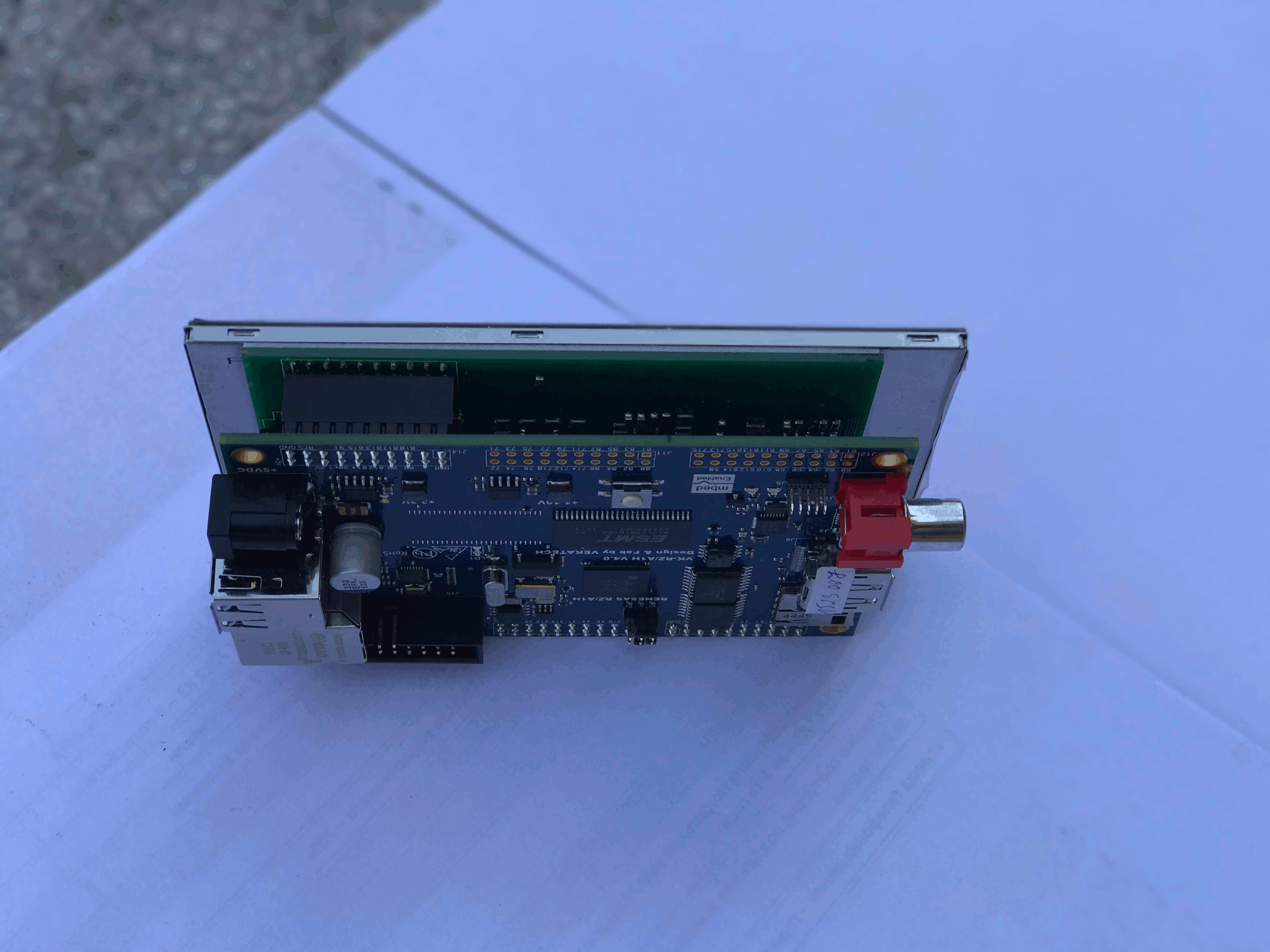
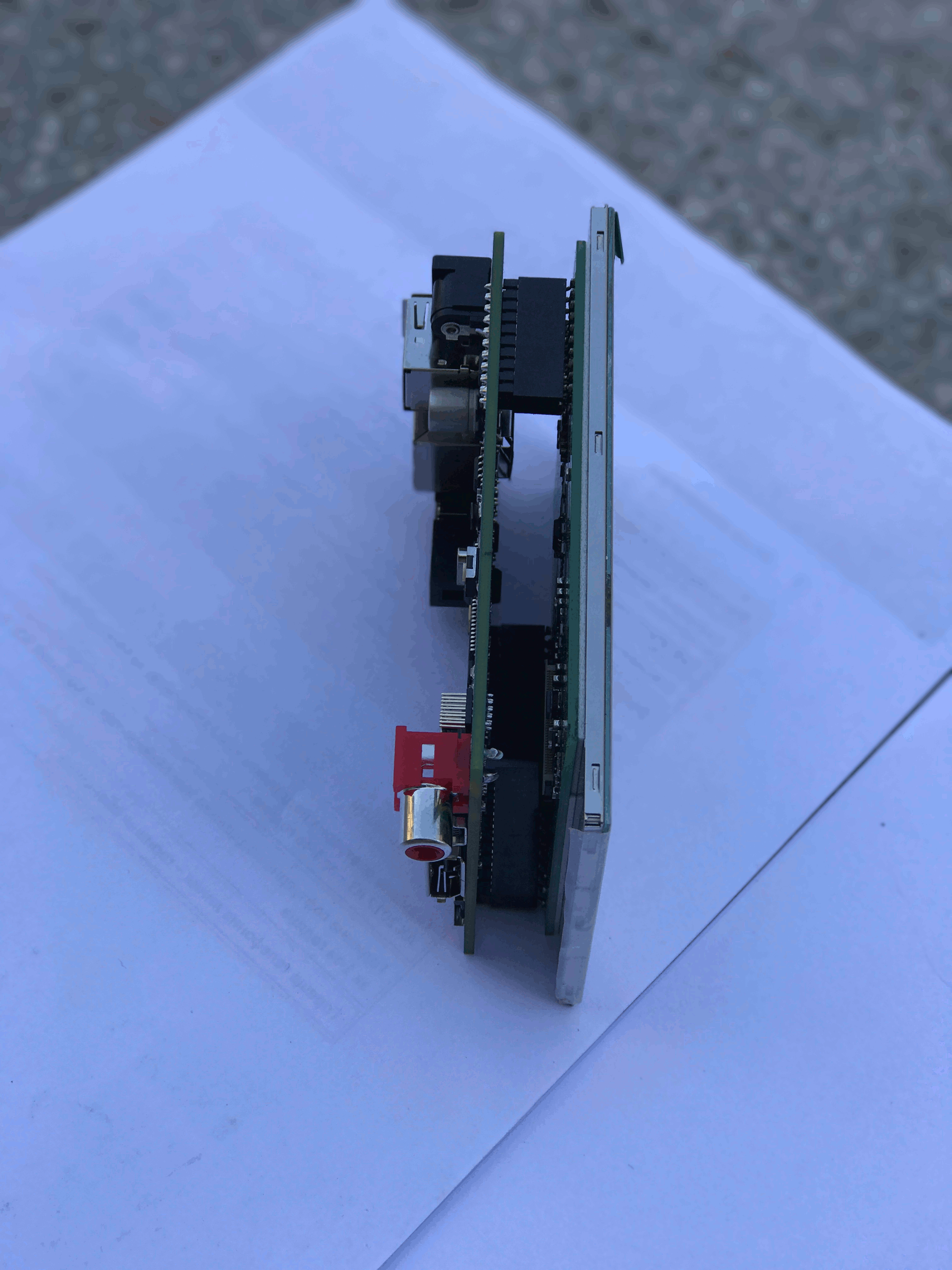
VKLCD70RT
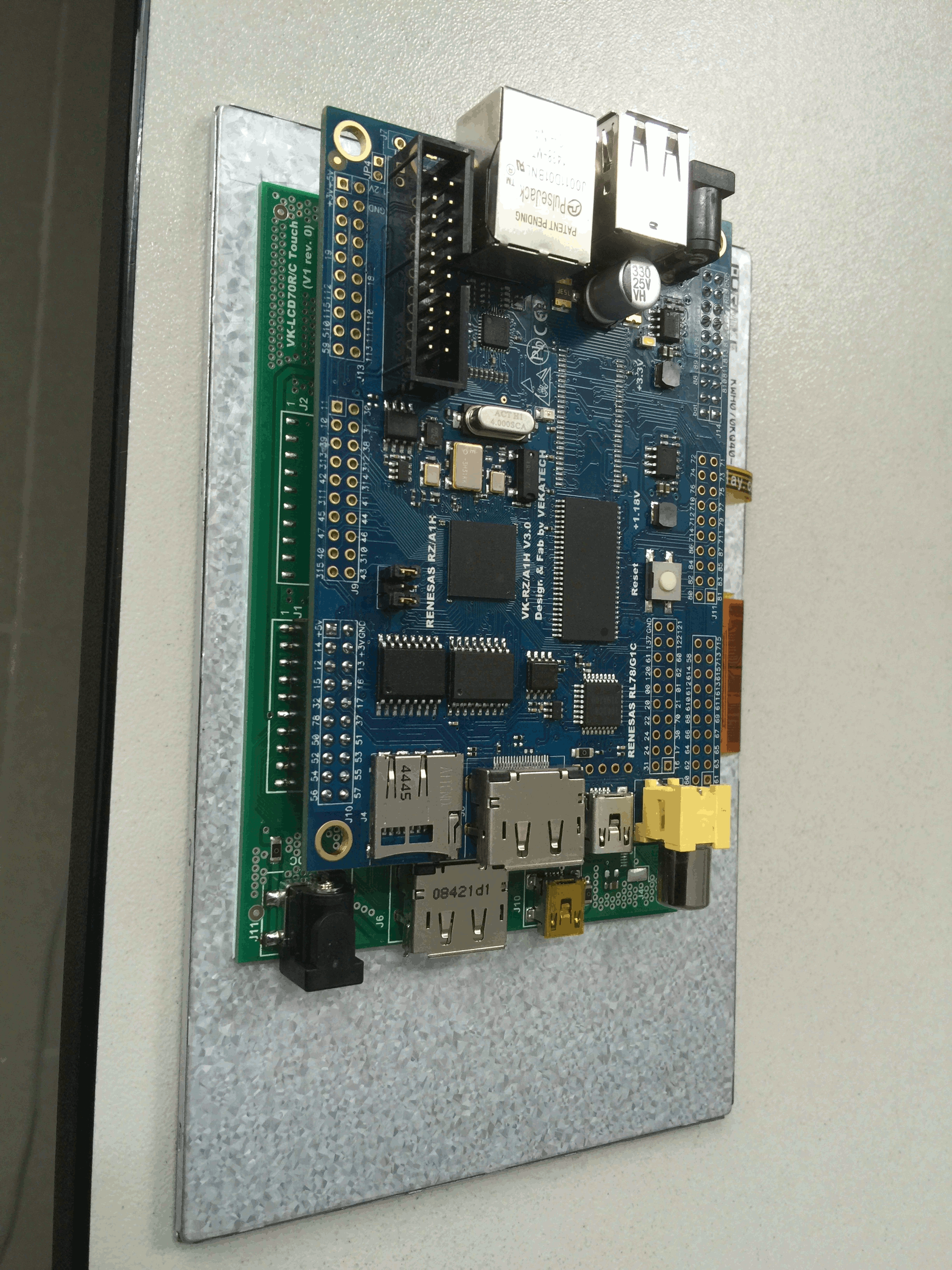
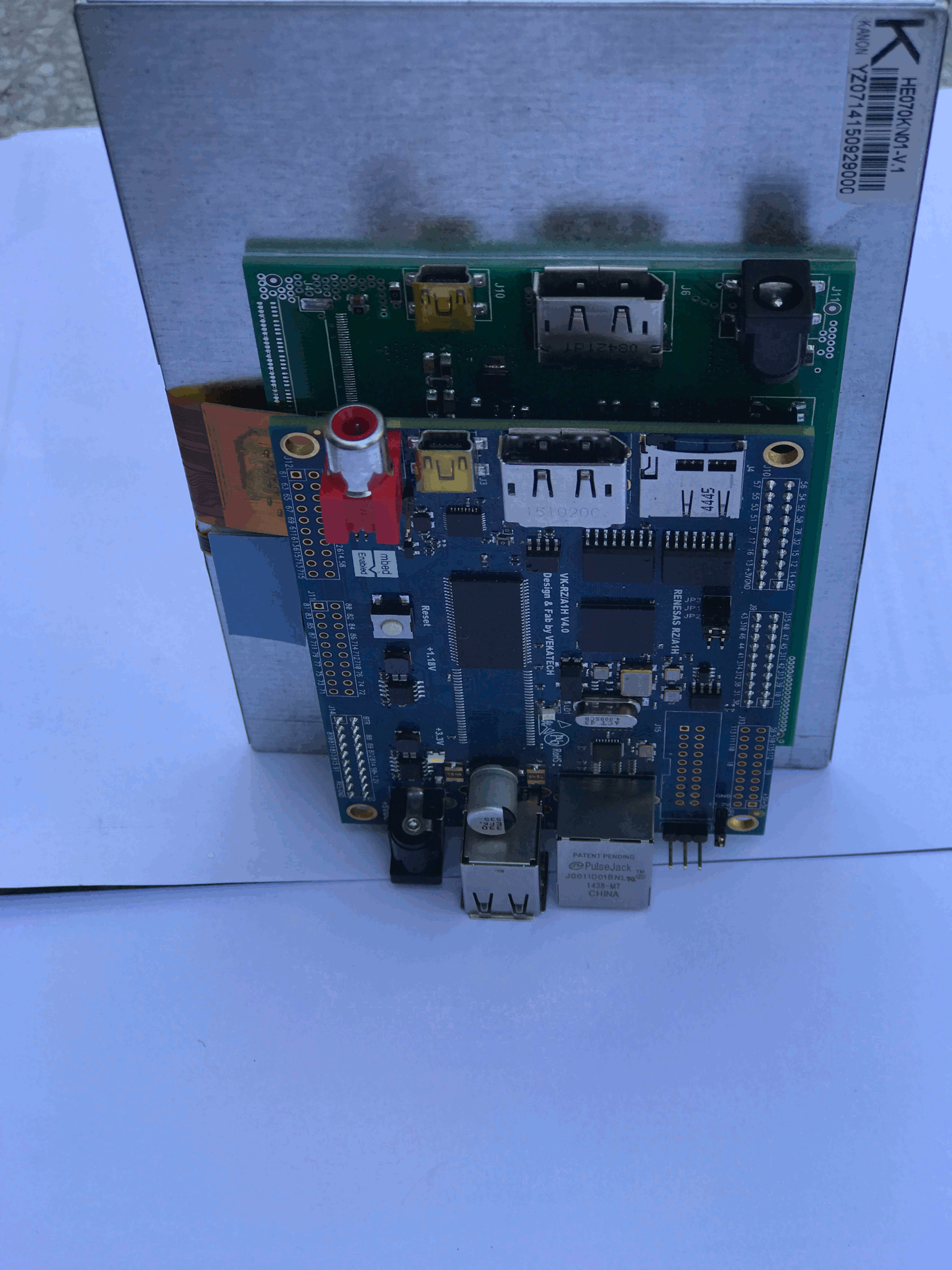
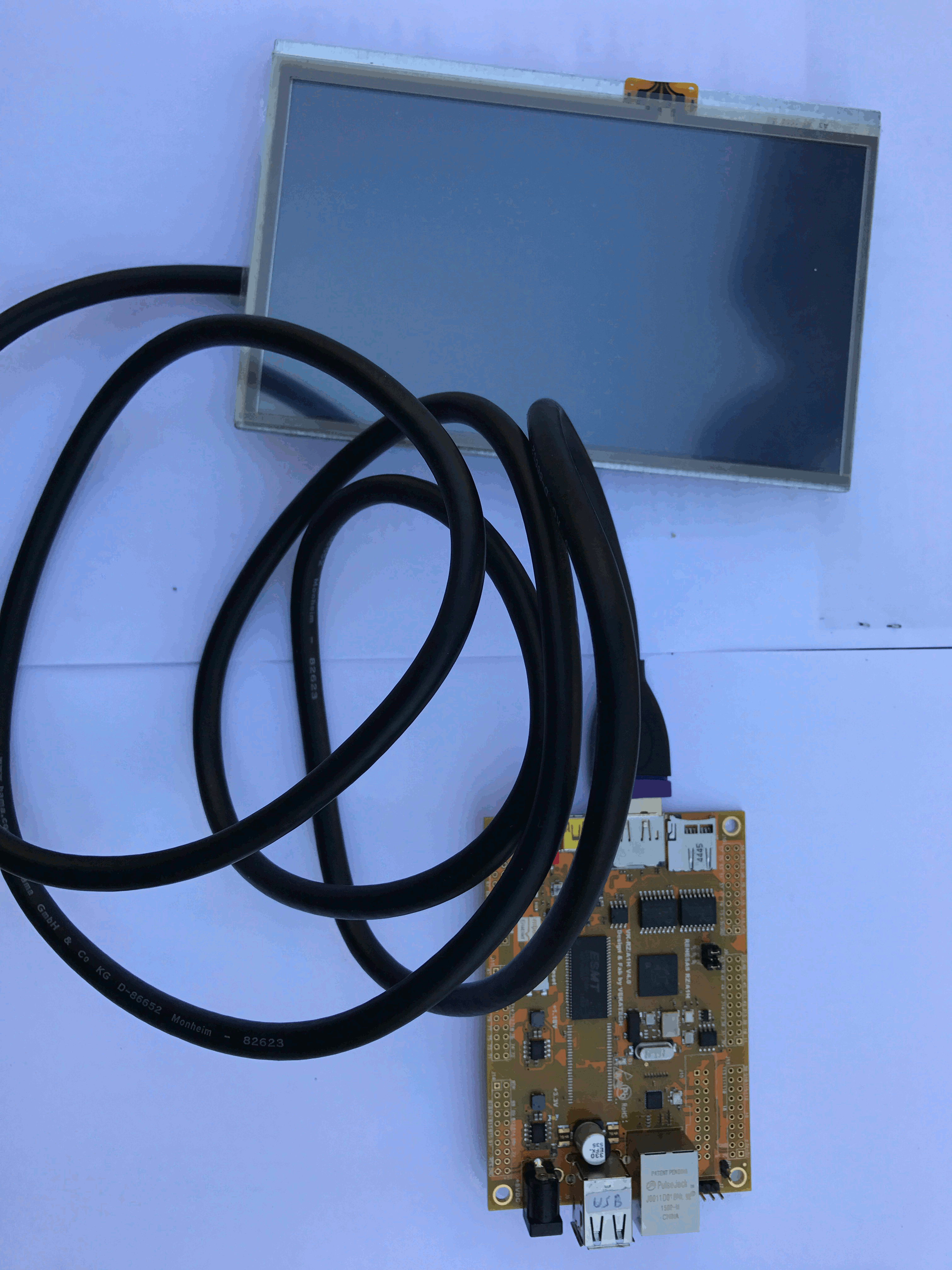
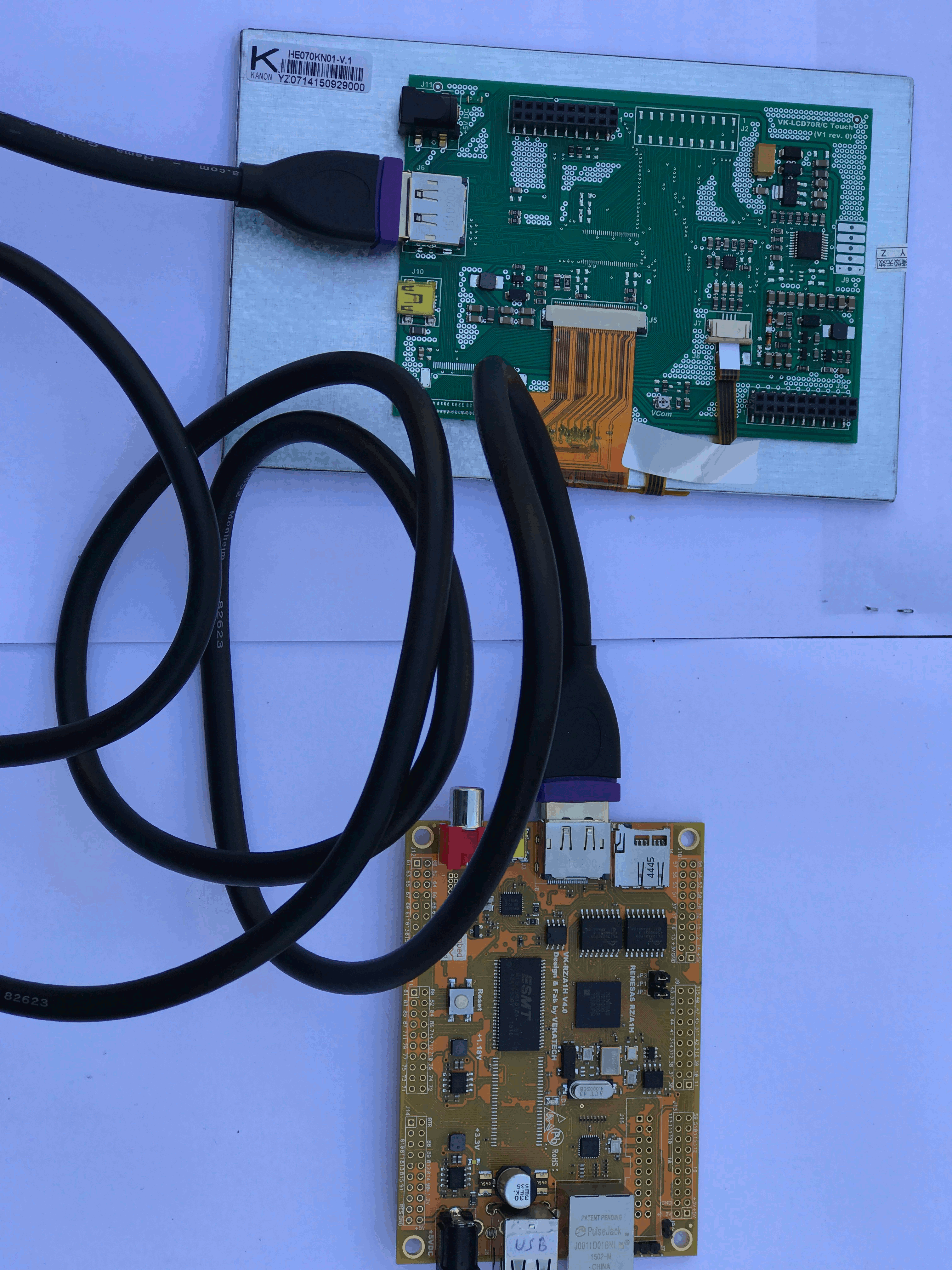
How to Configure ?
You can choose which display is installed by altering the lcd_panel.h file
Leave the active one & comment out the others:
#define LCD_VDC5_CH0_PANEL LCD_CH0_PANEL_VKLCD50RTA //#define LCD_VDC5_CH0_PANEL LCD_CH0_PANEL_VKLCD70RT
You can alter the whole demo with your pictures if you like:
How to compile ?
- The Demo can be compiled in 3 modes:
- I. Execution from the internal 10-MB on-chip SRAM.
- II. Execution from the on-board serial FALSH in dual (32-MB) mode.
- After import in the online compiler just leave only the VKRZA1H_DOUBLE.sct & delete all others linker files in the TOOLCHAIN_ARM_STD folder.
- Drag & drop the result binary in MBED disk, (previously inited in double flash mode)
- III. Execution from the on-board serial FALSH in single (16-MB) mode.
- After import in the online compiler just leave only the VKRZA1H_SINGLE.sct & delete all others linker files in the TOOLCHAIN_ARM_STD folder.
- Drag & drop the result binary in MBED disk, (previously inited in single flash mode )
Quick presentation:
Other demos ?
More demos you can find on our FTP
Diff: USB/USBisochronous/USBIsochronous.h
- Revision:
- 0:6435b67ad23c
--- /dev/null Thu Jan 01 00:00:00 1970 +0000
+++ b/USB/USBisochronous/USBIsochronous.h Thu Feb 16 10:23:48 2017 +0000
@@ -0,0 +1,249 @@
+// USBIsochronous.h
+#pragma once
+#if !defined (__CC_ARM) && (!defined (_POSIX_C_SOURCE) || (_POSIX_C_SOURCE < 200112L))
+#if defined(__ICCARM__)
+#include <iar_dlmalloc.h>
+#define memalign __iar_dlmemalign
+#else
+#include <malloc.h>
+#endif
+#endif
+
+class IsochronousEp;
+struct HCITD { // HostController Isochronous Transfer Descriptor
+ __IO uint32_t Control; // +0 Transfer descriptor control
+ uint8_t* BufferPage0; // +4 Buffer Page 0
+ HCITD* Next; // +8 Physical pointer to next Isochronous Transfer Descriptor
+ uint8_t* BufferEnd; // +12 buffer End
+ __IO uint16_t OffsetPSW[8]; // +16 Offset/PSW
+ IsochronousEp* ep; // +32 endpoint object
+ uint8_t* buf; // +36 buffer
+ // +40
+ HCITD(IsochronousEp* obj, uint16_t FrameNumber, int FrameCount, uint16_t PacketSize);
+ inline void* operator new(size_t size, int buf_size) {
+ void* p;
+ struct HCITD * wk_hcitd;
+ void* q;
+#if !defined (__CC_ARM) && (!defined (_POSIX_C_SOURCE) || (_POSIX_C_SOURCE < 200112L))
+ p = memalign(0x20, size);
+ if (p != NULL) {
+ q = memalign(0x1000, buf_size);
+ if (q != NULL) {
+ wk_hcitd = (struct HCITD *)p;
+ wk_hcitd->buf = (uint8_t*)q;
+ } else {
+ free(p);
+ p = NULL;
+ }
+ }
+ return p;
+#else
+ if (posix_memalign(&p, 0x20, size) == 0) {
+ if (posix_memalign(&q, 0x1000, buf_size) == 0) {
+ wk_hcitd = (struct HCITD *)p;
+ wk_hcitd->buf = (uint8_t*)q;
+ } else {
+ free(p);
+ p = NULL;
+ }
+ return p;
+ }
+ return NULL;
+#endif
+ }
+
+ inline void operator delete(void* p) {
+ struct HCITD * wk_hcitd = (struct HCITD *)p;
+ free((void *)wk_hcitd->buf);
+ free(p);
+ }
+
+ inline uint16_t StartingFrame() {
+ return Control & 0xffff;
+ }
+
+ inline void SetStartingFrame(uint16_t FrameNumber) {
+ Control = (Control & 0xffff0000) | FrameNumber;
+ }
+
+ inline uint8_t FrameCount() {
+ return ((Control>>24)&7)+1;
+ }
+
+ inline uint8_t ConditionCode() {
+ return Control>>28;
+ }
+};
+
+struct _HCED { // HostController EndPoint Descriptor
+ __IO uint32_t Control; // +0 Endpoint descriptor control
+ HCTD* TailTd; // +4 Physical address of tail in Transfer descriptor list
+ __IO HCTD* HeadTd; // +8 Physcial address of head in Transfer descriptor list
+ _HCED* Next; // +12 Physical address of next Endpoint descriptor
+ // +16
+ _HCED(int addr, uint8_t ep, uint16_t size, int lowSpeed = 0) {
+ Control = addr | /* USB address */
+ ((ep & 0x7F) << 7) | /* Endpoint address */
+ (ep!=0?(((ep&0x80)?2:1) << 11):0)| /* direction : Out = 1, 2 = In */
+ ((lowSpeed?1:0) << 13) | /* speed full=0 low=1 */
+ (size << 16); /* MaxPkt Size */
+ Next = NULL;
+ }
+
+ inline void* operator new(size_t size) {
+ void* p;
+#if !defined (__CC_ARM) && (!defined (_POSIX_C_SOURCE) || (_POSIX_C_SOURCE < 200112L))
+ p = memalign(16, size);
+ return p;
+#else
+ if (posix_memalign(&p, 16, size) == 0) {
+ return p;
+ }
+ return NULL;
+#endif
+ }
+
+ inline void operator delete(void* p) {
+ free(p);
+ }
+
+ inline uint8_t FunctionAddress() {
+ return Control & 0x7f;
+ }
+
+ inline int Speed() {
+ return (Control>>13)&1;
+ }
+
+ inline void setFunctionAddress(int addr) {
+ Control &= ~0x7f;
+ Control |= addr;
+ }
+
+ inline void setMaxPacketSize(uint16_t size) {
+ Control &= ~0xffff0000;
+ Control |= size<<16;
+ }
+
+ int Skip() {
+ return (Control>>14) & 1;
+ }
+
+ void setSkip() {
+ Control |= (1<<14);
+ }
+
+ void setFormat() {
+ Control |= (1<<15);
+ }
+
+ template<typename T>
+ inline bool enqueue(T* td) {
+ if (td) {
+ T* tail = reinterpret_cast<T*>(TailTd);
+ if (tail) {
+ tail->Next = td;
+ TailTd = reinterpret_cast<HCTD*>(td);
+ return true;
+ }
+ }
+ return false;
+ }
+
+ template<typename T>
+ inline T* dequeue() {
+ T* head = reinterpret_cast<T*>(reinterpret_cast<uint32_t>(HeadTd)&~3); // delete Halted and Toggle Carry bit
+ T* tail = reinterpret_cast<T*>(TailTd);
+ if (head == NULL || tail == NULL || head == tail) {
+ return NULL;
+ }
+ HeadTd = reinterpret_cast<HCTD*>(head->Next);
+ return head;
+ }
+ template<typename T>
+ void init_queue(T* td) {
+ TailTd = reinterpret_cast<HCTD*>(td);
+ HeadTd = reinterpret_cast<HCTD*>(td);
+ }
+};
+
+struct _HCCA { // Host Controller Communication Area
+ _HCED* InterruptTable[32]; // +0 Interrupt Table
+ __IO uint16_t FrameNumber;// +128 Frame Number
+ __IO uint16_t Pad1; // +130
+ __IO HCTD* DoneHead; // +132 Done Head
+ uint8_t Reserved[116]; // +136 Reserved for future use
+ uint8_t Unknown[4]; // +252 Unused
+ // +256
+ inline void* operator new(size_t size) {
+ void* p;
+#if !defined (__CC_ARM) && (!defined (_POSIX_C_SOURCE) || (_POSIX_C_SOURCE < 200112L))
+ p = memalign(256, size);
+ return p;
+#else
+ if (posix_memalign(&p, 256, size) == 0) {
+ return p;
+ }
+ return NULL;
+#endif
+ }
+
+ inline void operator delete(void* p) {
+ free(p);
+ }
+
+ inline void enqueue(_HCED* ed) {
+ for(int i = 0; i < 32; i++) {
+ if (InterruptTable[i] == NULL) {
+ InterruptTable[i] = ed;
+ } else {
+ _HCED* nextEd = InterruptTable[i];
+ while(nextEd->Next && nextEd->Next != ed) {
+ nextEd = nextEd->Next;
+ }
+ nextEd->Next = ed;
+ }
+ }
+ }
+
+ inline void dequeue(_HCED* ed) {
+ for(int i = 0; i < 32; i++) {
+ if (InterruptTable[i] == ed) {
+ InterruptTable[i] = ed->Next;
+ } else if (InterruptTable[i]) {
+ _HCED* nextEd = InterruptTable[i];
+ while(nextEd) {
+ if (nextEd->Next == ed) {
+ nextEd->Next = ed->Next;
+ break;
+ }
+ nextEd = nextEd->Next;
+ }
+ }
+ }
+ }
+};
+
+#define HCITD_QUEUE_SIZE 24
+
+class IsochronousEp {
+public:
+ void init(int addr, uint8_t ep, uint16_t size, uint8_t frameCount = 4, uint8_t queueLimit = 3);
+ void reset(int delay_ms = 100);
+ HCITD* isochronousReceive(int timeout_ms);
+ int isochronousSend(uint8_t* buf, int len, int timeout_ms);
+ HCITD* get_queue_HCITD(int timeout_ms);
+ uint16_t m_PacketSize;
+ void disconnect();
+ void irqWdhHandler(HCITD* itd) {m_queue.put(itd);} // WDH
+ int getQueueNum() {return m_itd_queue_count;}
+private:
+ HCITD* new_HCITD(IsochronousEp* obj);
+ Queue<HCITD, HCITD_QUEUE_SIZE> m_queue; // ITD done queue
+ int m_itd_queue_count;
+ int m_itd_queue_limit;
+ uint16_t m_FrameNumber;
+ int m_FrameCount; // 1-8
+ void enable();
+ _HCED* m_pED;
+};